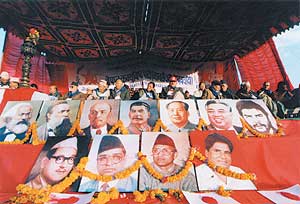 An insurgency does not have a clear beginning or a neat end. Like monsoon floods, it arrives, it devastates, and departs, leaving destruction in its wake. But just as floods teach people how to cope with another one next time round, there are lessons to be learnt from insurgencies too.
An insurgency does not have a clear beginning or a neat end. Like monsoon floods, it arrives, it devastates, and departs, leaving destruction in its wake. But just as floods teach people how to cope with another one next time round, there are lessons to be learnt from insurgencies too. There are signs that the Maoist leadership has come to the realisation that, for now, the armed struggle is a dead end. There could be many factors that have led to this, and we tried to list some of them in previous issues. Comrade Prachanda has apologised for the excesses his cadre have committed in the name of revolution, although he is silent about what he is going to do about them. The "students" of the ANNFSU (Revolutionary) have publicly promised to mend their ways. Government has softened its criticism of the Maoists. The truce holds, and peace seems within reach. But this will not be a lasting peace unless the government addresses the root causes of the insurgency.
Despite the havoc Maoists have created, the revolt has exposed the hollowness of Nepal's political leaders who have discredited and squandered our hard-won democracy. It has also shown the depth of frustration of a neglected people whose basic needs have been ignored for too long. More than a decade after the promulgation of a constitution that made the people sovereign, rural Nepal is still waiting to see what it actually means to be the true rulers of this country. Call them ignorant or illiterate, but they have yet to see and feel the supposed advantages of democracy. And, mark this, they know exactly who the crooks are. The Maoists had felt the pulse of the people and they knew the anger, frustration and hopelessness in the hinterland. They let the people down by fighting a futile, wasteful war in their name, that is another matter. They lived with the people-in many cases they were the people. Like Mao said, they were like fish in water. After the rebels lay down their guns, that is the kind of intimacy that political parties and their activists should be aiming for. Much of this is happening in many parts of Nepal as local self-governance takes root. Such successful examples of grassroots democracy in action must be replicated nationwide if we are to prevent an even more desperate insurgency replacing the present one.
Nepalis know the limitations of their country's resources only too well. It is the experts and the populist leaders who want to transform Nepal into Singapore or Switzerland. The people themselves would be quite happy even if the process of building a more just and tolerant society were to begin-if there were a glint of hope at the end of the long dark tunnel. Despite the utopia that the Maoists have promised, all the people really want is to be left to live in peace. The government therefore has to re-establish the rule of law. National highways can't be blocked by five hooligans protesting a traffic accident to extort money from travellers. There must be equality before the law for elected leaders who misuse their mandate and plunder the people.
That done, people must be made to feel free. This can only happen by creating an environment where every individual's right to security, dignity and identity is respected. It goes beyond law and order: it includes jobs, education for all, and health services. In the past 12 years social inequities have grown, the gap between rich and poor has grown. Democracy must mean equal opportunity. The dignity of every individual in a larger collective is what democracy is all about. Every person needs to be respected; caste, community, class and gender differences should not be obstacles for an individual's progress. That is the government's role beyond the peace talks. To do what it was supposed to be doing all along, but now with added commitment and urgency to make up for lost time. Otherwise just peace will be just a mirage.


